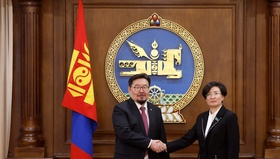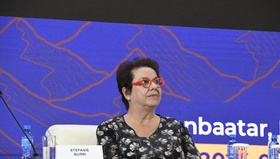ADDRESSING STRUCTURAL INJUSTICES AND INEQUALITIES TOWARDS INCLUSIVE SOCIETIES
Distinguished guests,
Ladies and gentlemen,
Structural inequality describes disparities in wealth, resources, and other outcomes that result from discriminatory practices of institutions such as legal, educational, business, government, and health care systems.
Structural inequalities result from power imbalances when one group has historically set the rules that intentionally or unintentionally exclude others from access to wealth and resources.
Humanity has long strived to achieve inclusiveness but despite some progress we continue to encounter numerous challenges.
In recent years, the impacts of COVID-19, along with increased occurrences of natural disasters as well as regional conflicts and war, have significantly hindered our efforts towards reducing inequality, improving access to justice, and fostering sustainable development. Today, the world is once again facing the inequality that we had a century ago.
Research from international organizations reveals that during the pandemic, the income of the world's wealthiest 1% doubled, while that of the poorest 60 percent declined substantially. Over 800 million workers worldwide lost their income during this period, underscoring the formidable challenge of addressing structural injustices and inequalities toward an inclusive society.
Mongolia closed its borders to China in the early stages of the virus but the pandemic triggered severe economic slowdown in the country and the government has put together a comprehensive set of response measures to mitigate the COVID-19 impact. The measures include the Countercyclical Development Expenditure Program (CDEP), which consists of three packages: (1) support public health protection; (2) social protection to support citizens and businesses; and (3) support vulnerable businesses and fiscal stimulus measures.
Mongolia started its coronavirus vaccination rollout in early 2021, and by the end of the year 66.5% of the population had been fully vaccinated with 28% of them having a booster shot.
Measures to mitigate the Covid-19 pandemic specially targeted most vulnerable. Many countries around the world experienced surge in poverty level post pandemic. Mongolia experienced 1.7% decline in poverty with targeted Covid-19 pandemic measures.
The pandemic has unearthed many dimensions of inequality that could not have been fully identifiable before. To reduce disparities arising from income, geographics, age, gender, the Government of Mongolia has initiated and implemented number of reforms.
Last year, Trans-Altai Sustainability Dialogue focused on SDG 5, gender equality and succeeded in increasing women’s quota in parliamentary election from 20% to 30%. Redrafted Labor code addressed changes in the organization of work and in society by introducing provisions that recognize non-standard forms of employment while providing more support for working families.
We identified great disparity in public service between rural and urban areas. For instance, 2022 PISA programme identified students in city schools outperformed students in aimags and students in aimags outperformed students in soums in all three subjects with student in soums lagging cities by 2.5 years of learning. This can be similary applied to healthcare and other public services that are understaffed, underqualified and underpayed. To address the issue, in 2023, the government has implemented a strategy to boost basic salaries for civil servants by 40% average and introduced minimum 20% increase for those in remote areas. In 2024, basic salary is further increased by 10-20%. These efforts aim to enhance public services' quality and align with the Rural Revival project to foster socio-economic progress nationwide. With two phase increase, within a year, average civil servant salary increased by 72%. Newly implemented Education reform bill addresses some of the underlying issues such as teacher training, technological and infrastructure investment and curriculum development.
To support livelihood of elderly, pension was increased on average by 25% in 2023 and further increased in 2024 with economic expansion. With two phase increase, within a year, average pension is increased by 50%. To enhance the legal framework, after 29 years, the Social Insurance package was updated, introducing innovative measures to improve management of funds, benefits of insurance payers and insurance support of most vulnerable such as caregivers of children with disability and herders.
Burden of diseases and health issues on livelihood of people, especially most vulnerable needs to be addressed by improving healthcare system. Over 90% of the population is covered by social health insurance. Though average life expectancy at birth has increased, it still faces a double burden of non-communicable and some communicable diseases. In 2022, Government has initiated "Nationwide Health Program for Preventive and Early-Detection Checkups" for early cancer detection. Within a year, a total of 1.3 million citizens have engaged in the program and facilitated the diagnosis of tumors at a treatable stage.
Structural injustice requires a multifaceted approach that tackles the root causes and empowers marginalized communities. While the road to justice may be challenging, abovementioned solutions are contributing to positive change.
In terms of policy changes and legal solutions, we need to enact and enforce laws that promote equality, protect human rights and ensure equal opportunities. It is important to establish legal framework that hold individuals and institutions accountable for perpetuating injustice. To ensure wide array of voices are reflected in drafting and deliberation of legal solutions, Law on legislation was passed which stipulate specific process for public deliberation before submission to parliament. Parliament of Mongolia has launched D-Parliament web-based platform for public to participate in online deliberation and comment on submitted legislations. With the constitutional amendment of 2023, the election will be held with 48 out of 126 to be proportionate list with gender zipper system. Political parties are taking the initiative to make the list more inclusive. Chairman of Mongolian People’s Party, Prime Minister L.Oyun-Erdene announced that he will have person with disability be listed amongst the top 5 party list. He further announced to make the list more inclusive with representatives of teachers, doctors etc.
Grassroots movements and activism has played a pivotal role in driving social change and challenge oppressive systems and advocate for the rights of the marginalized. Parliament of Mongolia is discussing Whistleblower protection bill to amplify the experience and foster solidarity among diverse communities and whistleblowers.
For a country with such a large landmass yet a small population, geographical disparity is an impending issue. Due to lagging rural development, we have seen an influx of migration to Ulaanbaatar, resulting in a city where half the population live. To improve livelihood in rural areas, the government is Mongolia proposed a regional development policy, dividing the vast country into 6 rural regions and constructing five ring roads linking aimag centers and border ports . The year 2024 is the Year to Support Regional Development and for the first time, 2024 Parliamentary Election will be organized by zonal or regional constituencies, or six regional constituents.
Mongolia has implemented robust state policies and measures aimed at addressing structural injustices and inequalities towards inclusive societies. It is evident that it is a challenging undertaking and global initiatives, stability, and peaceful coexistence are pivotal in its success. Trans-Altai Sustainability Dialogue serves as an essential platform for us to elevate public awareness, showcase good practice and strengthen multi-stakeholder collaboration.
May our collaborative efforts and determination succeed in creating a more inclusive, fair, and equitable society.
Thank you for your attention

 Eng
Eng  Монгол
Монгол

